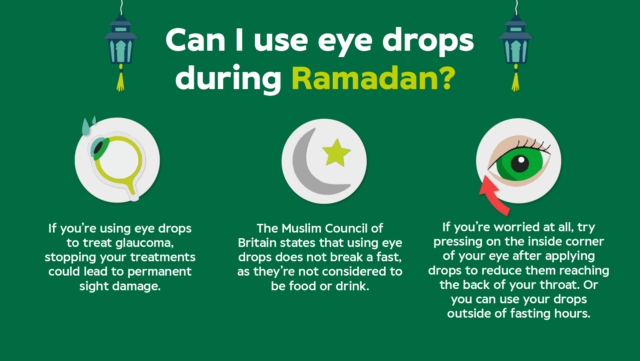EXPERTS are urging Muslims across London with glaucoma to continue using their eye drops during Ramadan to avoid putting their eye health at risk.
The holy month of Ramadan, which starts on April 12, will see Muslims fast be-tween dawn and sunset. However, those who have glaucoma – an estimated 50,000 in the UK – may be putting their sight in jeopardy if they are inclined to stop using their eyedrops during this period.
Research has shown that almost half (45.5%) worry that using eye drops would nullify their fast, as excess liquid can drain through the tear ducts to the back of the throat. That is why Specsavers, together with Glaucoma UK and the Muslim Council of Britain, is warning of the danger that stopping eye drops poses, including vision loss.
Joanna Bradley, Head of Support Services at Glaucoma UK, says: ‘It is vital that Muslims keep using their eye drops to treat their glaucoma during Ramadan as stopping, even for a short period, could cause irreversible damage to their sight.
‘It is also important to highlight that eye drops are not considered food or drink in almost all Islamic schools of thought, therefore, even if drops do reach the back of the throat, the fast is not affected.
‘For additional reassurance, there are a few things that people can do to minimise this risk, including a technique called punctal occlusion, which involves closing the tear duct immediately after putting in drops, by putting finger pressure at the corner of the eye next to the nose. This reduces the risk of the drops reaching the back of the throat, and also keeps the eye drop in the eye where it needs to be. Alternative-ly, use drops before dawn or after sunset, outside of fasting hours.’
Glaucoma is a progressive eye condition that can happen when naturally-occurring fluid inside the eye does not drain properly, causing a build-up of pressure which damages the optic nerve. There are two main types – chronic glaucoma, which de-velops slowly with subtle changes to vision, and acute glaucoma, which develops rapidly with a sudden, painful build-up of pressure in the eye.
Although it often affects both eyes, in a lot of cases it can be symptomless until it has already damaged your sight, so regular eye tests – and making sure that you follow your treatment plan if diagnosed – really matter.
Specsavers optometrist and store director, Mohammed Rehmani, adds: ‘If glaucoma is left untreated or unmanaged it can cause irreversible vision loss. However, if it is picked up early and treated it can be successfully managed, minimising sight loss. It is also more important now than ever to ensure correct hygiene measures are taken when touching your face, which includes thoroughly washing your hands in line with government guidelines before putting in your drops. If you have any concerns make sure you book an appointment to see your optometrist.’




